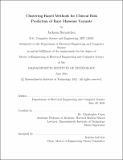Clustering-Based Methods for Clinical Risk Prediction of Rare Missense Variants
Author(s)
Bernatchez, Jackson
DownloadThesis PDF (409.8Kb)
Advisor
Cassa, Christopher
Terms of use
Metadata
Show full item recordAbstract
A long-standing goal in clinical genomics is to map individual genetic variants to clinical outcomes. Typically, variants which lead to loss of function (e.g. nonsense or stop-codon inducing variants, frameshifts, or deletions) are more easily classified as pathogenic in an established disease gene. However, there are many other missense variants identified in established disease genes which are more challenging to classify. Improving predictions of such variants has the potential to lead to clinically actionable solutions for individual patients. In this paper, we develop and evaluate several new clustering-based approaches for predicting the clinical risk of rare missense variants. We find that our results are comparable to existing methods, and offer several opportunities to significantly improve clinical risk predictions for missense variants.
Date issued
2021-06Department
Massachusetts Institute of Technology. Department of Electrical Engineering and Computer SciencePublisher
Massachusetts Institute of Technology